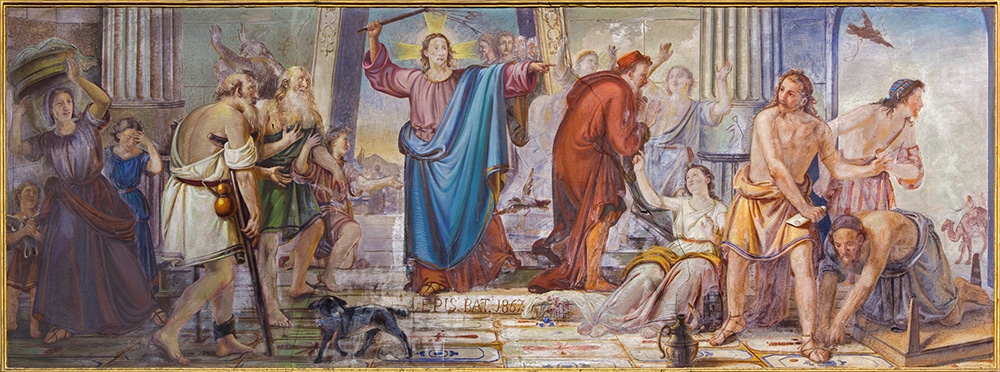
And he raises a ruckus. He overturns the tables of the money changers, throws out all those selling pigeons for sacrifice.
And he exclaims, “Take these out of here, and stop making my Father’s house a marketplace” (Jn 2:16).
This ruckus alone might have been enough to draw the ire of the authorities. But Jesus does not stop there.
Jesus’ fellow Jews ask him for a sign. Where does your authority come from?
| March 7 – Third Sunday of Lent |
|---|
|
Ex 20:1-17
Ps 19:8, 9, 10, 11
1 Cor 1:22-25
Jn 2:13-25
|
Jesus performs no immediate sign but prophetically speaks of his own death and resurrection. Destroy this temple, he says, and I will raise it up in three days.
Jesus’ proclamation raises both confusion and belief. Many in Jerusalem see the signs that he is doing. They come to believe in Jesus.
And yet, the evangelist tells us that despite his growing fame, “Jesus would not trust himself to them because he knew them all, and did not need anyone to testify about human nature. He himself understood it well” (Jn 2:24-25).
He knew them all.
He knew what human nature is capable of. The Word made flesh, the splendor of the Father, knows every crack and crevice of the human heart.
The Book of Exodus is the drama of a human heart slow to love. God has rescued Israel from slavery, led them dry-shod and safe through the Red Sea. And yet, almost immediately Israel forgets.
The Ten Commandments in Exodus are not a series of abstract rules given by a faraway deity. These Commandments are grounded in an act of memory. Remember what God has done, how the Lord has rescued you from slavery in Egypt.
Remember. And make no idols for yourself, nothing to lead you into forgetfulness. You want to avoid idolatry. Keep the Lord’s name holy, mark the Sabbath, honor your mother and your father and love your neighbor.
And yet, any reader of Exodus knows how quickly Israel turns to idolatry. They make a golden calf from the very material that was to be used for the construction of a place for the worship of the God of Abraham, of Isaac and of Jacob.
Jesus knows the human heart. He knows the human heart because he is the Word made flesh, God from God, light from light. He knows the human heart because he is an obedient son of Israel. He knows the human heart because, in his heart alone, is a goodness that surpasses all other hearts.
And Jesus asks us this day to investigate our own hearts.
Our baptism has not rescued us from the broken tendency of the human person to create idols.
The idol of consumption, of an unending desire to possess.
The idol of racism in which our hardness of heart causes us to hate our neighbor because of the color of their skin.
The idol of putting too much trust in a political figure, making a fallen man into a false messiah who has come to redeem the polis.
Like Israel, there is a way out of this idolatry. We must remember.
Remember what the Father has done through his Son, Jesus Christ.
Jesus knows human nature. But he also shows us what human nature can become when it gives up the pursuit of idols: “God so loved the world that he gave his only Son, so that everyone who believes in him might not perish but might have eternal life” (Jn 3:16).
Timothy P. O’Malley, Ph.D., is the director of education at the McGrath Institute for Church Life at the University of Notre Dame.





